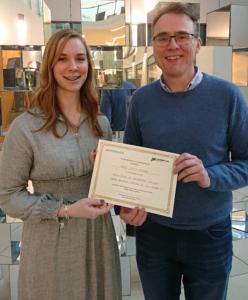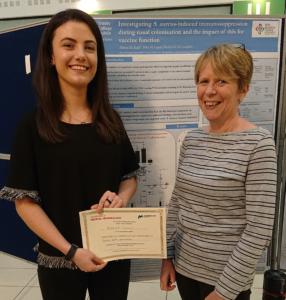DAPI meeting: Presentation prize winners
Posted on October 7, 2019 by Microbiology Society
This year, the Microbiology Society’s journals will be sponsoring oral and poster prizes at conferences and meetings around the world. We will be getting to know a little more about the winners and their research.
The annual Dublin Academy of Pathogenomics and Infection Biology (DAPI) meetings act as a forum for PhD students and postdocs based at Trinity College Dublin and University College Dublin to present their research. We spoke to Amy O’Callaghan, winner of the Microbiology prize for best oral presentation, and Alanna Kelly, winner of the Journal of General Virology prize for best poster presentation.
Amy O’Callaghan

What was the title of your winning talk?
Modulation of Macrophage Function by Gut Metabolites during Bacterial Infection or Inflammation
Who or what inspired you to be a scientist?
My upbringing! My mam is a nurse and was always keen to teach me and my brothers about the human body, health and disease. My dad is very interested in science and he always had New Scientist magazines lying around. Combining these two influences together, I realized science was the career for me!
What are you currently working on and what area of your research excites you the most?
Currently, I’m studying the effect of gut metabolites on not only macrophage function, but also on epithelial cells, in particular, the monolayer of the gastrointestinal tract. The excitement of the unknown really stands out for me in my everyday lab work!
How would you explain your talk to a child under 10?
When you eat food, that food goes in to your stomach and eventually passes through your body (like going to the toilet!). Attached to your stomach is an organ that has lots of different types of bacteria growing in it. Good bacteria, but sometimes bad bacteria. These bacteria feed off the food you eat, and they also have to ‘go to the toilet’. The waste they produce is termed by-product. The cells that make up this organ, the gastrointestinal tract, are exposed to these bacteria and the by-products that they produce. Other cells in our body, called immune cells, keep us healthy and happy and fight off any infection. In the gastrointestinal tract, immune cells wander, and they have shown to produce the same by-products as bacteria. My research is focussed on studying these by-products from both bacteria and human immune cells to see if they are having a positive or negative effect on human health.
What would you be doing in your career if you weren’t a scientist?
I always liked the idea of being a primary school teacher. Knowing that you have the ability to teach younger generations what this world has to offer gives you a warm feeling. The summer holiday term time was also very appealing! But I am happy with the path I chose, and who knows what the next few years have to bring!

Alanna Kelly
What was the title of your winning poster?
Investigating Staphylococcus aureus-induced immunosuppression during nasal colonisation and the impact of this for vaccine function.
Who or what inspired you to be a scientist?
Since a very young age I was fascinated by the idea that microbes could cause catastrophic infections and disease. From then on, I knew I wanted to try and contribute to the improvement of vaccines and therapies against these disease-causing microbes.
What are you currently working on and what area of your research excites you the most?
I am currently working on the characterization of the immune response to S. aureus colonisation and trying to improve the efficacy of future anti-S. aureus vaccines. I am really excited by the field of vaccines and phage therapy.
How would you explain your poster to a child under 10?
S. aureus is a bug that lives in our nose with little effect. However, given the chance it can cause infections and our immune system has to fight it. I want to understand how our cells react to S. aureus and try improving vaccines so our immune system can win the fight.
What would you be doing in your career if you weren’t a scientist?
If I had never become a scientist I would have liked to have become a veterinary surgeon as my other big passion is looking after animals.
Stay tuned for more prize winners!
